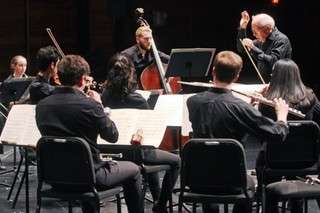|
Back
Art and Ecstacy New York
Bruno Walter Orchestral Studio, Juilliard School
11/07/2017 -
Mauricio Kagel: Stücke der Windrose: “Südosten” & “Süden”
Giya Kancheli: Exil
Vivian Yau (soprano)
New Juilliard Ensemble, Joel Sachs (Founder and Conductor)

J. Sachs/New Juilliard Ensemble (© Hiroyuki Ito)
“Musicians don’t believe in God any more, but they all believe in Bach.”
Mauricio Kagel (1931-2008)
“When listening to Mozart, I almost–almost!!–believe there may be a god.”
Christopher Hitchens (1949-2011)
The estimable Kagel and Hitchens were almost wrong. If Giya Kancheli’s final measures of Exile, performed by the New Juilliard Ensemble last night, were not a reflection of God or a god or a moment of infinite holiness in a firmament parallel with our own, then no other proof would exist.
Even if this god is a heartless, forbidding, eternally damning god.
Joel Sachs performed two selections from Mauricio Kagel’s Stücke der Windrose to open the program, but the last half was devoted to Kancheli’s radiant, unquestionably glorious music. Mr. Sachs told the audience last night–twice–that they should read the five poems of this work before the performance, so as not to divert from the music, and he was right. This was less a concert than a 50–minute prayer.
A prayer ending with the most desolate cry for help.
The four poems, by Paul Celan and Hans Sahl, were indeed desolate, yet the voice and chamber orchestra, with the typical Kancheli monotone, slow, agonizing melodies made them transcend words and even music.
The chamber ensemble was a strange one. Flutes (including alto and bass), violin, viola, cello, bass, piano/synthesiser and recorded sound. The singer, Vivian Yau, like the instruments, sung almost without vibrato. At time, typically Kancheli, her melodies were doubled by cello or viola. At other times, as in the 23rd Psalm...

V. Yau
But I will get to that later. The first four songs were transparent, but, like church windows at night, the images, pictures, tones were glistening onto the darkness. Ms. Yau’s German was impeccable, but this was not important. Her voice had athe stillness, almost a stasis that was not hypnotising (that would have been too simple). Rather, one wanted to follow her as she slowly unwound her lines, only to bring them back again to a sleep and dream, dream and sleep.
The 23rd Psalm is usually given first. But Mr. Kancheli allowed Joel Sachs to make this the final statement. It was the only way to do it. Again, we had the plaintive melodies (except for a delightful almost jocund section, “Thou preparest a table...and my cup runneth over.”)
Toward the end, Mr. Kancheli finished the 23rd Psalm and added “The nations are sunk down in the it they made... Lord, hearken unto my voice.” Here is where Ms. Yau’s voice was doubled with a previous recording, and we had an inkling of electronic bells... No “amen” no “so be it”, no “hosanna”.
Yet Ms. Yau’s voice, Mr. Sach’s tempos and the whole ensemble seemed to rise from its melodic depths. Mr. Kancheli once said that he was trying to create “the silence of church, mosque and synagogue” when there was no service. I guess that is okay on paper. Listening, though, was a ceremony in itself.
The Kancheli was preceded by another ensemble playing two sections from Kagel’s Stücke der Windrose, and like all Kagel, one is delighted and underwhelmed with his language and his lack of anything to say.
He has much in common with György Ligeti in background–both of them Jewish, both of them refugees from unlikely countries (Argentina and Hungary), and both of them masters of dozens musical styles. Ligeti was more outrageous, but they were both eclectic, Ligeti was laugh-out-loud or wonder, Kagel was...well, really good stuff, but not exactly memorable stuff.
In these two selections, Mr. Sachs led his estimable New Juilliard Ensemble in the “southeast”, a South American potpourri from the Caribbean to the Amazon, and a tarantella (with a few eerily quite sections) from the Mediterranean “south”. The New Juilliard Ensemble became a kind of cocktail-salon with clarinet, harmonium, strings and a brilliantly original percussionist, Harrison Honor (how the hell do you imitate a tuba on a drum-set??).
Kagel is always fun, always theatrical. But somehow, after Vivian Yau’s resplendent Exile, his composition seemed unfairly insignificant.
Harry Rolnick
|